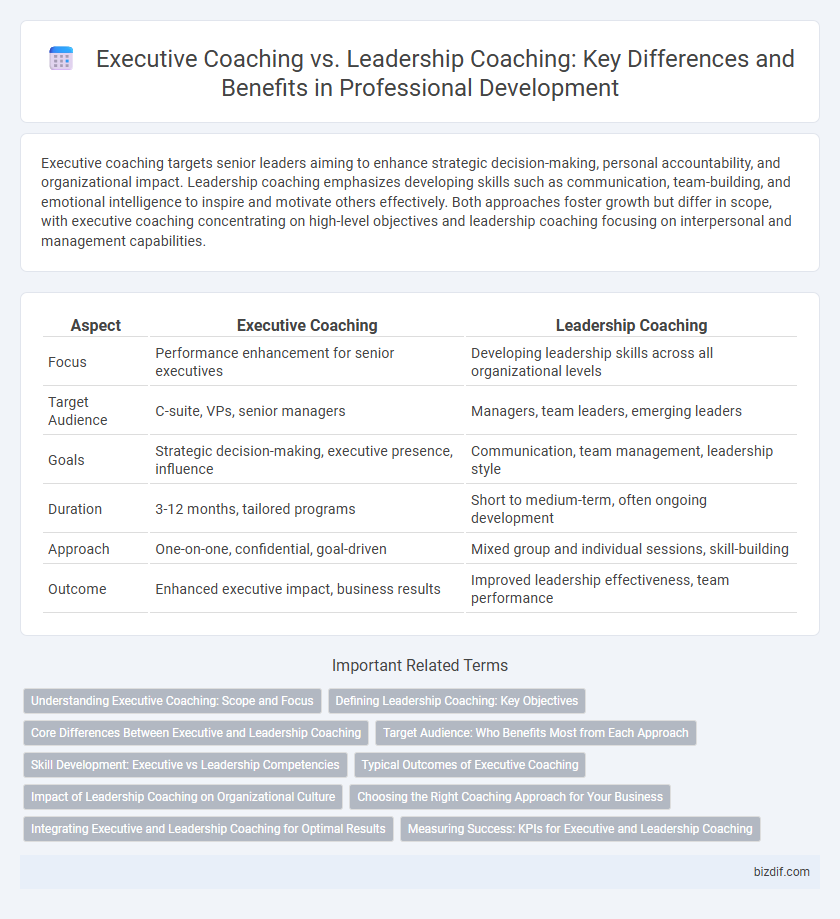Executive coaching targets senior leaders aiming to enhance strategic decision-making, personal accountability, and organizational impact. Leadership coaching emphasizes developing skills such as communication, team-building, and emotional intelligence to inspire and motivate others effectively. Both approaches foster growth but differ in scope, with executive coaching concentrating on high-level objectives and leadership coaching focusing on interpersonal and management capabilities.
Table of Comparison
| Aspect | Executive Coaching | Leadership Coaching |
|---|---|---|
| Focus | Performance enhancement for senior executives | Developing leadership skills across all organizational levels |
| Target Audience | C-suite, VPs, senior managers | Managers, team leaders, emerging leaders |
| Goals | Strategic decision-making, executive presence, influence | Communication, team management, leadership style |
| Duration | 3-12 months, tailored programs | Short to medium-term, often ongoing development |
| Approach | One-on-one, confidential, goal-driven | Mixed group and individual sessions, skill-building |
| Outcome | Enhanced executive impact, business results | Improved leadership effectiveness, team performance |
Understanding Executive Coaching: Scope and Focus
Executive coaching primarily targets high-level professionals such as CEOs and senior managers, focusing on strategic decision-making, organizational impact, and personal leadership effectiveness. The scope of executive coaching extends to enhancing executive presence, emotional intelligence, and stakeholder management to drive business outcomes. Leadership coaching, while overlapping, often addresses broader leadership skills applicable across various organizational levels, emphasizing team dynamics and leadership style development.
Defining Leadership Coaching: Key Objectives
Leadership coaching focuses on enhancing a leader's ability to inspire, guide, and influence teams toward achieving organizational goals. It targets the development of strategic thinking, emotional intelligence, and communication skills essential for effective leadership. Unlike executive coaching, which often centers on individual performance and career advancement, leadership coaching emphasizes fostering a broader impact on organizational culture and team dynamics.
Core Differences Between Executive and Leadership Coaching
Executive coaching targets senior professionals aiming to enhance decision-making, strategic thinking, and performance in high-stakes corporate roles. Leadership coaching focuses on developing broader skills such as emotional intelligence, team management, and influencing abilities across various organizational levels. Core differences include the scope of impact, with executive coaching being more individualized and outcome-driven, while leadership coaching emphasizes growth and adaptability within team dynamics.
Target Audience: Who Benefits Most from Each Approach
Executive coaching primarily benefits senior executives and C-suite leaders aiming to enhance strategic decision-making, improve organizational influence, and achieve high-stakes business goals. Leadership coaching targets mid-level managers and emerging leaders seeking to develop leadership skills, boost team performance, and foster personal growth within organizational hierarchies. Both approaches cater to different career stages and organizational roles, ensuring tailored development for maximum professional impact.
Skill Development: Executive vs Leadership Competencies
Executive coaching hones strategic decision-making, financial acumen, and organizational influence, targeting skills essential for senior management roles. Leadership coaching emphasizes emotional intelligence, team building, and effective communication to cultivate inspirational and inclusive leadership. Both approaches develop competencies vital to driving business success but concentrate on different skill sets aligned with organizational hierarchy and goals.
Typical Outcomes of Executive Coaching
Executive coaching typically drives enhanced decision-making capabilities, improved strategic thinking, and heightened emotional intelligence among senior leaders. It fosters increased self-awareness, accountability, and resilience, directly impacting organizational performance and leadership effectiveness. These outcomes distinguish executive coaching by targeting the unique challenges faced by top-level executives in complex business environments.
Impact of Leadership Coaching on Organizational Culture
Leadership coaching directly influences organizational culture by enhancing leaders' emotional intelligence and communication skills, fostering a more collaborative and innovative work environment. Unlike executive coaching, which centers on individual performance and strategic decision-making, leadership coaching emphasizes relational dynamics that shape team behaviors and company values. This cultural shift can lead to increased employee engagement, reduced turnover, and improved overall organizational effectiveness.
Choosing the Right Coaching Approach for Your Business
Executive coaching targets senior leaders and focuses on enhancing strategic decision-making, executive presence, and performance in high-stakes environments. Leadership coaching applies to managers at all levels, aiming to develop interpersonal skills, team management, and leadership styles that drive organizational culture and employee engagement. Selecting the right coaching approach depends on your business goals, leadership hierarchy, and specific development needs to maximize impact and foster sustainable growth.
Integrating Executive and Leadership Coaching for Optimal Results
Integrating executive coaching and leadership coaching enhances organizational performance by aligning personal development with strategic goals. Executive coaching targets individual C-suite skills and decision-making, while leadership coaching focuses on team dynamics and influence across all management levels. Combining both approaches ensures comprehensive growth, fostering adaptive leadership and sustainable success.
Measuring Success: KPIs for Executive and Leadership Coaching
Measuring success in executive coaching focuses on KPIs such as improved decision-making effectiveness, enhanced strategic thinking, and achievement of organizational goals. Leadership coaching KPIs emphasize enhanced team performance, increased employee engagement, and development of leadership competencies. Both coaching types utilize 360-degree feedback and behavioral assessments to track progress and impact on business outcomes.
Executive Coaching vs Leadership Coaching Infographic

 bizdif.com
bizdif.com